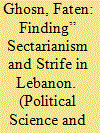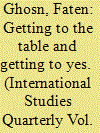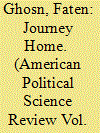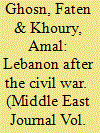|
|
|
Sort Order |
|
|
|
Items / Page
|
|
|
|
|
|
|
| Srl | Item |
| 1 |
ID:
102495


|
|
|
|
|
| Publication |
2011.
|
| Summary/Abstract |
The main argument of this article is that we need to incorporate domestic-pressure arguments into conflict management studies and, at the same time, we need to include conflict-management opportunities in the study of domestic-international theory. This study looks at the impact of domestic incentives on a state's decision to negotiate. The primary hypothesis is that domestic turmoil will increase the likelihood that rival states with a history of aggressive interaction shift their foreign policy to a more accommodative one. Testing my argument on strategic rivals between 1945 and 1995, I find that after controlling for the factors of history and level of hostility between the rivals, anti-government unrest actually increases the likelihood of negotiations taking place, while acts threatening the downfall of the regime tend to decrease the chance of witnessing negotiations.
|
|
|
|
|
|
|
|
|
|
|
|
|
|
|
|
| 2 |
ID:
167350


|
|
|
| 3 |
ID:
101618


|
|
|
|
|
| Publication |
2010.
|
| Summary/Abstract |
This paper analyzes the conditions that encourage (or hinder) conflicting states in coming to the negotiating table. It also explores the factors that influence the successfulness of such negotiation attempts. A main argument of the paper is that it is important to look at what brings states to the table, because this may have a direct or indirect impact on the outcome of such negotiations. While confirming some of the findings within the conflict management literature, this paper demonstrates that contextual factors seem to have different effects or a different impact on each stage, implying that while certain factors may bring states to the table, they may not be the same factors that make agreements possible.
|
|
|
|
|
|
|
|
|
|
|
|
|
|
|
|
| 4 |
ID:
180819


|
|
|
|
|
| Summary/Abstract |
While the UNHCR promotes voluntary repatriation as the preferred solution to refugee situations, there is little understanding of variation in refugees’ preferences regarding return. We develop a theoretical framework suggesting two mechanisms influencing refugees’ preferences. First, refugees’ lived experiences in their country of origin prior to displacement and in their new host country create a trade-off in feelings of being anchored to their origin or host country. Second, firsthand exposure to traumas of war provides some refugees with a sense of competency and self-efficacy, leading them to prefer to return home. We test these relationships with data from a survey among Syrian refugees hosted in Lebanon. We find refugees exposed to violence during the war have a sense of attachment to Syria and are most likely to prefer return. Refugees who have developed a detachment from Syria or an attachment to Lebanon are less likely to prefer return.
|
|
|
|
|
|
|
|
|
|
|
|
|
|
|
|
| 5 |
ID:
110337


|
|
|
|
|
| Publication |
2011.
|
| Summary/Abstract |
This article investigates the effectiveness of Lebanon's post-conflict strategies by exploring the "reconciliation" efforts that were undertaken after the war, and highlights the obstacles to such efforts. While Lebanon signed a peace agreement in October 1989 to officially end a 15-year civil war, today it is still a troubled country. Many have attributed Lebanon's inability to shed its conflict-prone past to its sectarian system; however, this article traces the ongoing instability, in part, to the failure of the government to deal effectively with the abuses of the civil war.
|
|
|
|
|
|
|
|
|
|
|
|
|
|
|
|
| 6 |
ID:
164559


|
|
|
|
|
| Summary/Abstract |
How do individuals’ personal experiences with various aspects of political violence affect their attitudes toward hosting conflict refugees? More specifically, how do their personal exposure to violence, their own personal experience of being displaced, and their recent contact with refugees influence these attitudes? To explore answers to these questions, we draw upon a recent survey of 2,400 Lebanese residents where we identify individuals who experienced violence during the Lebanese civil war (1975–90), those forced to flee their homes during that conflict, and those who enjoy recent contact with Syrian immigrant and/or displaced populations. We examine whether these distinct experiences affect respondents’ regard for members of the Syrian refugee population. Results demonstrate that historical exposure to violence and experience of displacement have no discernible impact on individual attitudes toward hosting refugees. We find much stronger evidence that attitudes are associated with whether individual respondents have had contact with Syrians in Lebanon; those with such interactions are significantly more likely to support hosting refugees, to consider hiring a refugee, or to allow one of their children to marry a refugee. Our findings suggest exposure to violence by itself does not correlate to positive sentiments toward refugees, especially over time. Further, finding ways to create positive contact between refugees and native populations may be associated with improving attitudes and relations between the two populations.
|
|
|
|
|
|
|
|
|
|
|
|
|
|
|
|
|
|
|
|
|